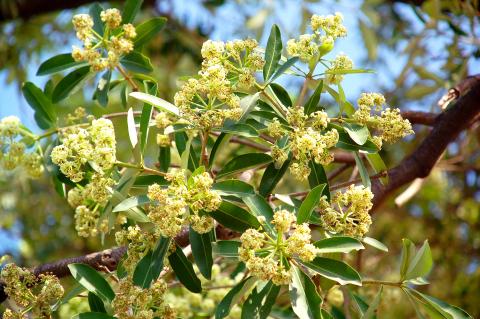A strong odor has recently been -plaguing the residents of Pingtung City during the night. Many of them thought it was the fault of the smokestacks in nearby industrial plants, but then discovered that the real culprit was a tree.
The smell that was making the residents feel nauseous and triggering headaches was coming from a type of evergreen tree called Alstonia scholaris — better known as the “Blackboard tree” or “Indian devil tree.” The tree is native to India and Southeast Asia, where its timber was commonly used to make blackboards for schools.
The neighborhoods of Yongsin Park (永新公園) have blackboard trees all around them and the trees’ intensely fragrant flowers bloom each November throughout the month.

Photo: Lee Li-fa, Taipei Times
During the night, the air becomes thick with the flowers’ pungent odor, preventing some people from sleeping. In the springtime, the trees produce wind-blown cotton seedlings that can cause health problems for asthmatics.
Residents’ patience with the trees has run out and they are demanding that the odor emitters be cut down. They say that if the city government cannot find a solution, they will demand compensation from the central government for the psychological and physical damage they have suffered due to the trees.
“I cannot stand it anymore. It stinks too much,” a resident said.
Officials from the Pingtung City Public Works Bureau said they receive a large amount of complaints during the tree’s flowering and seeding seasons. Aside from affecting some people’s health, the trees have adversely affected business at some local stores.
Some of the blackboard trees growing in schools and private households have already been felled and replaced with other varieties. However, officials say that blackboard trees in public spaces — such as those dotting the parks, river levees and sidewalks of the city — cannot be dealt with so easily as they propagate large numbers of seeds that have a rapid growth rate and thus their outward spread is not easily controlled.
An unnamed official at the Pingtung County Forestry Bureau said the offending trees did provide some advantages, such as being able to form leafy canopies that create shade in just a couple of years. However, he did add that another main drawback of the blackboard tree was its spongy wood, which makes it prone to toppling over in strong winds.
If people are not willing to chop the trees down, the official advised that they trim the leaves and branches just before the flowering season because this can prevent the release of the irritable odor and seedlings.
Officials from the Public Works Bureau said that they do not have the funds to carry out year-round trimming on all of the blackboard trees in the city.
However, they are planning to encourage schools and other public facilities to plant other types of trees when blackboard trees topple over in storms or die naturally to gradually phase them out.
Chen Chia-yin (陳嘉音), principal of the city’s Chihcheng Junior High School, said there used to be more than 30 blackboard trees at the school.
“Some of the trees are close to classrooms. The odor and release of the fibrous seedlings can severely affect students in class,” Chen said.
He said that the school asked the county government to cut some of the trees down and replace them with othes, and the school has only 10 trees left.

The inspection equipment and data transmission system for new robotic dogs that Taipei is planning to use for sidewalk patrols were developed by a Taiwanese company, the city’s New Construction Office said today, dismissing concerns that the China-made robots could pose a security risk. The city is bringing in smart robotic dogs to help with sidewalk inspections, Taipei Deputy Mayor Lee Ssu-chuan (李四川) said on Facebook. Equipped with a panoramic surveillance system, the robots would be able to automatically flag problems and easily navigate narrow sidewalks, making inspections faster and more accurate, Lee said. By collecting more accurate data, they would help Taipei

STATS: Taiwan’s average life expectancy of 80.77 years was lower than that of Japan, Singapore and South Korea, but higher than in China, Malaysia and Indonesia Taiwan’s average life expectancy last year increased to 80.77 years, but was still not back to its pre-COVID-19 pandemic peak of 81.32 years in 2020, the Ministry of the Interior said yesterday. The average life expectancy last year increased the 0.54 years from 2023, the ministry said in a statement. For men and women, the average life expectancy last year was 77.42 years and 84.30 years respectively, up 0.48 years and 0.56 years from the previous year. Taiwan’s average life expectancy peaked at 81.32 years in 2020, as the nation was relatively unaffected by the pandemic that year. The metric

TAKING STOCK: The USMC is rebuilding a once-abandoned airfield in Palau to support large-scale ground operations as China’s missile range grows, Naval News reported The US Marine Corps (USMC) is considering new sites for stockpiling equipment in the West Pacific to harden military supply chains and enhance mobility across the Indo-Pacific region, US-based Naval News reported on Saturday. The proposed sites in Palau — one of Taiwan’s diplomatic allies — and Australia would enable a “rapid standup of stored equipment within a year” of the program’s approval, the report said, citing documents published by the USMC last month. In Palau, the service is rebuilding a formerly abandoned World War II-era airfield and establishing ancillary structures to support large-scale ground operations “as China’s missile range and magazine

Passengers on Taiwan High Speed Rail (THSR) will be required to use headphones and make phone calls in gangways under new “quiet travel” rules starting Sept. 22. THSR Chairman Shih Che (史哲) told media that THSR will run a three-month promotional campaign to ensure widespread adoption of the new rules. Those repeatedly ignoring the guidance face the potential termination of their transport contract, which can result in them getting escorted off the train, according to THSR. Shih shared his hope to cultivate an environment conducive to rest and reading for the train’s passengers, stating that these changes aim to “promote self-discipline” among passengers